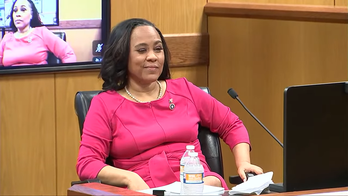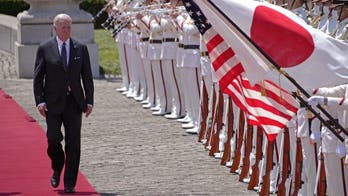MANCHESTER, N.H. – Mitt Romney improved his own 2008 New Hampshire primary showing by about 20,000 votes and is the first Republican non-incumbent ever to win both the Iowa caucuses and in New Hampshire.
But even though Romney exceeded 2008 Republican nominee John McCain's New Hampshire share by at least 3 points and improved on McCain's margin of victory by 12 points, Romney isn't getting credit for a great win.
In 1996, the last New Hampshire Republican primary without a Democratic race going on, there were about 20,000 fewer votes than were cast on Tuesday. That race even included the high-intensity grudge match between Pat Buchanan and Bob Dole and ended with the Dole defeat that foreshadowed his eventual general election failure.
But even though Romney beat historical results and met or exceeded the expectations set by other campaigns and pundits, they still don't want to give him credit for a win.
The Democrats aren't expected to ever praise Romney for anything, but it is revealing for the GOP frontrunner that conservatives are so unwilling to credit him for anything. And it shows some of the difficulty of the task ahead for an increasingly inevitable-looking Romney.
New Hampshire told the tale of the conservative movement in the 2012 presidential cycle. The three remaining Not Romney candidates -- former Speaker Newt Gingrich, Former Pennsylvania Sen. Rick Santorum and Texas Gov. Rick Perry -- combined for 20 percent of the vote, barely more than half of what Romney produced.
Gingrich and Santorum tied with 9 percent each, and Perry, who is following Fred Thompson's trajectory almost identically, limped in with 1 percent. They all promise that they can do better in South Carolina, which is no doubt true. While orthodox Catholic and Pennsylvanian Santorum may have a harder time down South, the other two should be able to make some kind of a stand.
But that's the problem. All three will be there in South Carolina and all three will divide the conservative vote and Romney, currently 10 points ahead in the Real Clear Politics average for the state, should be able to cruise down to Florida at the end of the month, where a victory would seal his status as the inevitable man.
Jon Huntsman is promising to compete in South Carolina and will take some moderate votes away from Romney, but following his Pierre DuPont-like performance in New Hampshire, it's hard to imagine Huntsman being much of a factor in the bright-red, heavily Protestant Palmetto State.
The conservatives, sensing the imminence of their defeat, have resorted to the best, most damaging line of attack on Romney: that he was unethical and greedy in his work as a private equity dude at Bain Capital.
The most damaging charge is that Romney and his crew found dying companies and bled them dry -- running up their debt and firing their workers -- to make profits for themselves. It is not helpful either that it is exactly the business in which Michael Douglas' Gordon Geckko was engaged in Oliver Stone's cinematic indictment of the Reagan era, "Wall Street."
Romney points to successes like Staples and Sports Authority where Bain provided the resources to expand and revitalize businesses and casts the failures as instances when their best efforts just weren't enough. But the charge is that in at least a few instances, Bain was a corporate scrap dealer, junking existing firms and jobs and cashing in the parts.
Gingrich is going very hard at Romney over this claim. Perry, stuck at 5 percent in the polls, is going even harder, invoking the term for the kind of carcass picking of which Romney is accused: vulture capitalism. Santorum has deemed the line of inquiry as legitimate but been understandably wary of joining in the kamikaze mission to stop Romney.
Exit polls in New Hampshire didn't show much sign that the attack worked here, but the charges haven't had time to really sink in. In the 10 days before South Carolina, thanks in part to massive spending by a pro-Gingrich Super PAC funded by a casino magnate, the topic will become preeminent.
This is a desperation play, but it works because it is a topic on which Republicans can rely on establishment media outlets to amplify. It's hard to get the New York Times and NBC to ask about Romney's slippery stance on social issues or his other conservative apostasies, but when the Not Romneys echo talking points from Occupy Wall Street and the Democratic National Committee, the press corps takes notice.
This is bad for Romney is that it legitimizes the inevitable line of attack from the Obama Democrats if Romney can endure through January. "Even your fellow Republicans questioned ..." It is good in another sense, in that it will tend to make the charges seem stale by the fall.
It seems to be all bad for the Not Romneys, though. Having failed to resolve the underlying question of which one of them should be the primary rival to Romney, their intended quarry is about to slip away with the nomination.
Their first task incomplete, the three musketeers, are now attempting to slow Romney down in South Carolina with either a loss or a close finish in South Carolina. It might buy them some time, but it's hard to see how it gets any of them the nomination. Bashing Romney may hurt the frontrunner, but it hurts his attackers too. And for protest voters looking to be heard without upending the process, pro-capitalist Ron Paul, who finished second here with more votes than the Not Romneys combined, provides a ready alternative to Perry, Gingrich and Santorum.
Another lesson to be taken from the lower turnout in New Hampshire and static Iowa showing: Voters are already tired of this ugly process. It seems unlikely that they will opt to prolong it by unhorsing Romney now.




